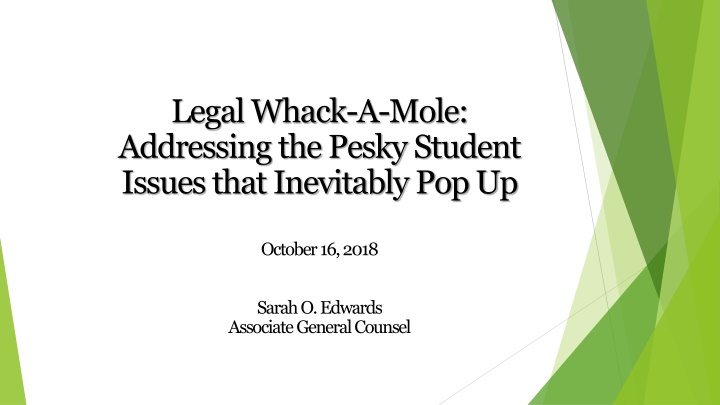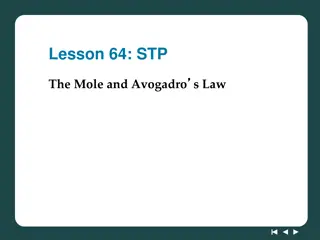
Addressing Pesky Student Issues: FERPA & First Amendment Insights
Dive into legal concepts like FERPA and the First Amendment to handle student issues effectively. Learn about FERPA's protections, what constitutes an education record, and exceptions to the law. Understand the boundaries of free expression on campus.
Download Presentation

Please find below an Image/Link to download the presentation.
The content on the website is provided AS IS for your information and personal use only. It may not be sold, licensed, or shared on other websites without obtaining consent from the author. If you encounter any issues during the download, it is possible that the publisher has removed the file from their server.
You are allowed to download the files provided on this website for personal or commercial use, subject to the condition that they are used lawfully. All files are the property of their respective owners.
The content on the website is provided AS IS for your information and personal use only. It may not be sold, licensed, or shared on other websites without obtaining consent from the author.
E N D
Presentation Transcript
Legal Whack-A-Mole: Addressing the Pesky Student Issues that Inevitably Pop Up October 16, 2018 Sarah O. Edwards Associate General Counsel
Agenda FERPA overview FERPA scenarios First Amendment overview Free expression scenarios
Family Educational Rights and Privacy Act (FERPA) Federal law enacted in 1974 Protects students education records from being disclosed without consent (or other exception) Permits a student to access his/her own education record University Policy 402, Student Records http://legal.uncc.edu/policies/up-402 also, short training module on OLA website
Family Educational Rights and Privacy Act (FERPA) Education record is any record that is: Directly related to the student and Maintained by the university Examples include: Personal information (that s not directory information) Disciplinary issues Grades Immunization records, CBCs, etc. Schedules Written communications with or about a student Disability status
Family Educational Rights and Privacy Act (FERPA) NOT education records: campus police records employment records (unless dependent on student status) peer-graded assignments BEFORE collection treatment records (medical/counseling) certain alumni records your observations about a student
Family Educational Rights and Privacy Act (FERPA) NOT education records (cont d): personal notes = in the sole possession of the maker, are used only as a personal memory aid, and are not accessible or revealed to any other person except a temporary substitute for the maker of the record * If your notes are stored on shared drives, in office file rooms, or in a software system that is accessible by others, they do not meet the personal notes exception.
Family Educational Rights and Privacy Act (FERPA) Student may consent to the disclosure of education records Guest Access Portal OR Electronic or paper form Student s presence and lack of objection is not sufficient.
Family Educational Rights and Privacy Act (FERPA) Acceptable electronic consent An email from the student s official UNC Charlotte email address Consent provided through the Guest Access Portal Any paper or online form that includes: A handwritten signature on a document, including when the entire document is scanned or faxed to the university A graphic image of a signature placed on a document using secure software that verifies the identity of the user on the other end (e.g. DocuSign) Marks, initials, or checkboxes provided through an online form that is accessible only after inputting one s NinerNet credentials and is tied to that individual s NinerNet account (for student or employee signatures) * More information is available at https://legal.uncc.edu/legal- topics/contracts/guidelines-accepting-digital-or-electronic-signatures
Family Educational Rights and Privacy Act (FERPA) Exceptions: To university officials if legitimate educational interest To parents if student is dependent To another university if student transfers Health/safety emergency Judicial order/subpoena Certain disciplinary information crimes of violence (just victim or victim and public) or alcohol/drug violations (if responsible)
FERPA Overview Exceptions (cont d): Directory information = information not generally considered harmful or an invasion of privacy if shared Unless privacy hold (on file with Registrar) At UNC Charlotte (UP 402), directory information is only: Student s name Major field of study Dates of attendance Enrollment status Degrees and awards (including scholarships) received * Student images (photos, videos, etc.) and student email addresses are only considered directory information if they are: (1) used in official University publications/websites or (2) required to be disclosed via contract.
Scenario The psychology department plans to host an event for senior psychology majors. Students can visit with a variety of potential employers as well as vendors who want to showcase the latest technology that can aid the students future practice. Several vendors want the email addresses of the students who will be attending the event to provide them information ahead of time and encourage the students to stop by their tables. Can you provide those? Several potential employers plan to ask the students that visit their tables to provide their GPAs. Is that permissible? The department wants to include pictures of the event on its website, which will likely include students and faculty as well as employers and vendors. Is that okay? One vendor asks if it can include some of the pictures the university takes at the event on its website. Is that okay?
Scenario One of your students has been placed in an internship with an off-campus facility as part of the practical experience required for her degree. The facility needs a clean criminal background check and a clean drug screening for the student before she begins her internship. Can the university share that information with the facility? Your facility liaison tells you that the facility might be interested in hiring the student when she graduates. You know that the student is currently failing a required class and will not be able to graduate if she does not raise that grade. What can/should you share with the facility? At a check-in, the student mentions to you that an employee at the facility pays a lot of attention to her, including making multiple comments about her physical attractiveness. It sort of creeps her out. With whom can/should you share this information? Your next door neighbor also works at that facility and asked you if any of your students are interning there this semester. What can you tell him?
Take Aways Limited use directory information (pictures and email addresses) can only be disclosed if you comply with the policy requirements (UP 402) FERPA governs all the student information an academic department collects, even if it looks medical (immunization records, drug screen records, etc.) FERPA requires either: Written consent from each student, or Provision in an agreement that the other party is considered a university official and agrees to comply with the requirements of FERPA, or Another exception Even with consent, a contract provision, or an exception, you should not disclose more information than is necessary
First Amendment Congress shall make no law . . . abridging the freedom of speech As a public institution, UNC Charlotte must comply with the First Amendment with respect to students, faculty, staff, and the public But the rules are different depending on the constituency and the forum Speech can be: What someone says (in class, at SoVi, at BOT meeting, etc.) What someone wears What someone writes/posts (on bulletin boards or online) What someone does (displays flag, gives middle finger, etc.)
First Amendment Legally, speech/expression is generally protected The Government has an interest in preventing speech expressing ideas that offend. And, as we have explained, that idea strikes at the heart of the First Amendment. Speech that demeans on the basis of race, ethnicity, gender, religion, age, disability or any other similar ground is hateful; but the proudest boast of our free speech jurisprudence is that we protect the freedom to express the thought that we hate. Matal v. Tam (2017) Practically, being exposed to a variety of viewpoints and engaging in debate are invaluable to a healthy academic environment
First Amendment Unprotected speech True threats Fighting words* Speech that incites imminent lawless action Obscenity/child pornography Unlawful harassment Defamation * so narrow that it s almost no longer an exception
First Amendment The university can make content-neutral rules governing the time, place, and manner of speech, such as: No disruption of normal university function, including classes No vandalism/destruction of property No posting signs on walls of university buildings except in specified places No using sound amplification The rules also have to be narrowly tailored to serve a significant government interest and leave open alternative channels for speech.
First Amendment Traditional public forum (e.g. streets, sidewalks, Belk plaza, CHHS/COED plaza) Reasonable time, place, and manner restrictions Content-neutral, viewpoint-neutral Limited public forum (e.g. university website, SGA meeting) Reasonable time, place, and manner restrictions Specified topic or specified invitees, viewpoint-neutral Nonpublic forum (e.g. classrooms, staff meetings, offices) May or may not be permitted to speak Restrictions still must be viewpoint-neutral






















